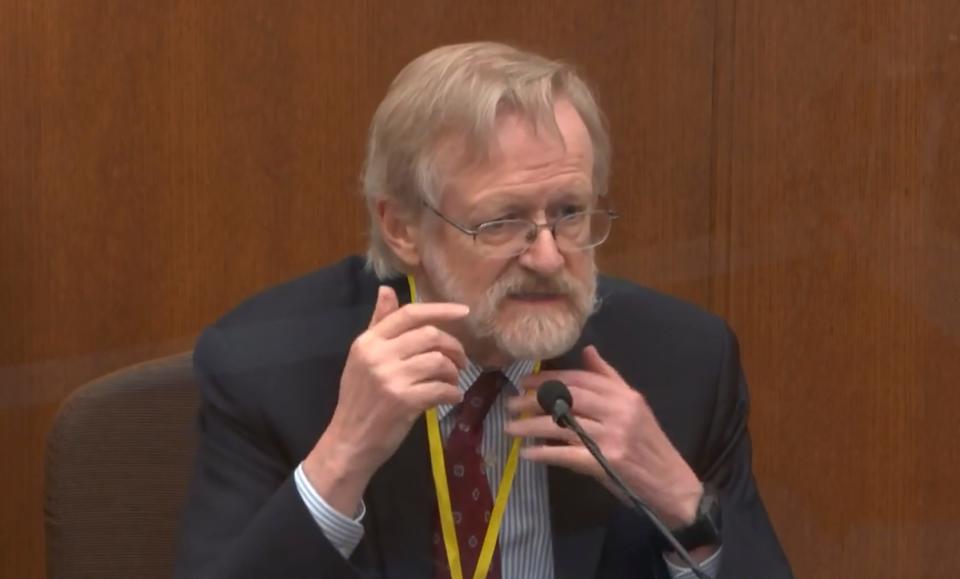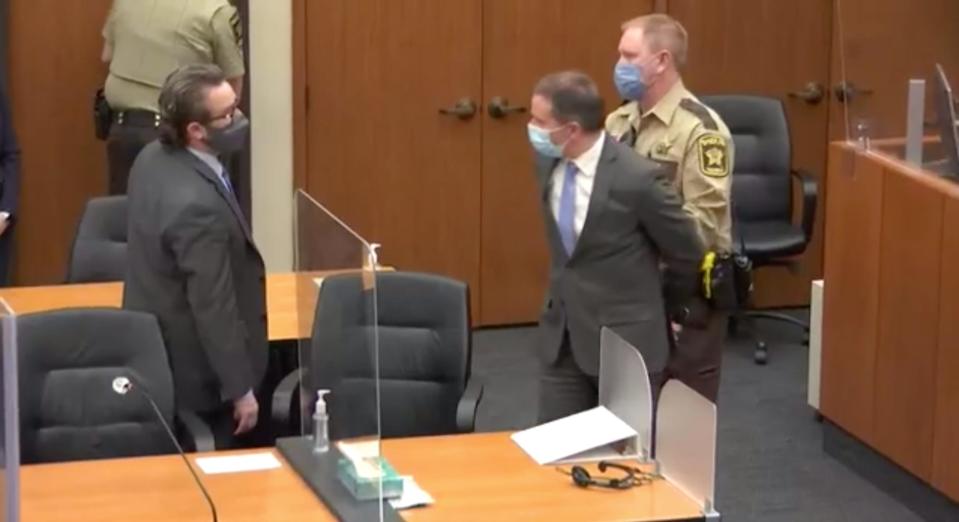'A harder case to prove': What Derek Chauvin's guilty verdict means for three other officers charged in George Floyd's death
Prosecutors may have secured a conviction against Derek Chauvin, but legal experts say the case against the three other former Minneapolis police officers charged in George Floyd's death is the harder one to prove.
"Their case isn't a slam-dunk by any stretch of the imagination," said Bradford Colbert, a Minnesota public defender and law professor at Mitchell Hamline School of Law in St. Paul.
Lawyers note the defense now has the advantage of seeing the state's arguments in Chauvin's trial and may claim that the other officers were simply following Chauvin's lead as the most senior officer on the scene that day.
"Given the other officers' more limited role, that will be a harder case to prove," said Ted Sampsell-Jones, a criminal defense attorney and law professor at Mitchell Hamline. "Not impossible, but more difficult."
Poll: Americans overwhelmingly approve of Chauvin guilty verdict
Another hurdle for prosecutors: Two of the officers were rookies with less than four days on the force as full officers. The lack of experience of those officers stands in stark contrast to Chauvin, a 19-year veteran who had trained one of the rookies.
At the same time, it's possible the prosecution's sweeping victory in Chauvin's case could prompt lawyers for the officers to push for a plea deal, according to Justin Hansford, a civil rights activist and law professor at Howard University.
"They certainly can get a fair trial, but 'will they decide to go to trial' is the question," Hansford said. "I think that the main impact from their perspective is on their calculation as to whether a jury is likely to give a conviction. If I was a lawyer for the other police, I would say that a plea deal is looking better and better."
Chauvin, who knelt on Floyd's neck for more than nine minutes, was found guilty Tuesday of second- and third-degree murder and second-degree manslaughter. Former officers Tou Thao, J. Alexander Kueng and Thomas Lane are each charged with aiding and abetting two of those charges: second-degree murder and second-degree manslaughter.
All four officers were fired the day after Floyd's murder last Memorial Day, and Hennepin County prosecutors charged them in early June. Thao, Keung and Lane have been out on $750,000 bail since the summer and are expected to stand trial together Aug. 23.
The former officers could face a maximum 40 years in prison if they're found guilty of aiding and abetting second-degree murder, plus up to 10 years for aiding and abetting second-degree manslaughter. However, the recommended sentencing for second-degree murder for someone with no criminal history ranges from 128 to 180 months. The recommended sentencing for aiding and abetting second-degree manslaughter is 41 to 57 months.
Matthew Frank, who oversees the Minnesota Attorney General's criminal division, is expected to lead the prosecution's case against the three officers. Who will join the state's case remains unclear.
Jon J. Lee, a professor at the University of Minnesota Law School, said he fully expects the attorney general's office to add the third-degree murder charge to their cases now that Chauvin has been found guilty of the charge.
What Tou Thao, J. Alexander Kueng and Thomas Lane did that day
Keung, 27, and Lane, 38, arrived first on the scene last Memorial Day, responding to a call about someone suspected of using a fake $20 bill. It was Keung's third shift as a full-fledged officer and Lane's fourth.
According to their records, Keung and Lane had joined the department in February 2019 and became officers in December. Minneapolis requires officers to serve a year on probation and train in the field with a more senior officer. Chauvin had trained Keung.
Chauvin and Thao, meanwhile, had far more experience – and complaints against them. Thao had been on the force nine years and Chauvin 19 years. Chauvin had 18 prior complaints against him. Thao had six, and the city of Minneapolis had settled at least one lawsuit against him.
Body-cam video played in the courtroom showed that Lane approached the car Floyd was in with two other people near Cup Foods. Lane pulled his gun on Floyd, who said, "Please don’t shoot me, Mr. Officer." Lane told Floyd to show his hands, and when Floyd put his hands on the steering wheel, Lane put his gun in his holster, according to the video.
Aftermath of Chauvin conviction: Lawmakers in Congress 'optimistic' about police overhaul
Lane ordered Floyd out of the car and handcuffed him, according to the video. He sat Floyd on the sidewalk and can be heard on video asking Floyd if he was "on anything." When Lane and Kueng stood Floyd up to put him in the squad car, Floyd fell to the ground.
That's when Chauvin and Thao, 35, arrived.
The officers tried to force Floyd into the squad car. Chauvin, Keung and Lane ultimately pinned Floyd down on the street – Chauvin with his knee on Floyd's neck, Keung on Floyd's back and Lane down by Floyd's legs – as Thao stood between officers and bystanders gathered on the sidewalk.
When Floyd was on the ground, pleading "I can't breathe," Lane asked Chauvin to roll Floyd on his side – twice – but Chauvin refused, according to prosecutors. Lane said he was "worried about excited delirium or whatever," and Chauvin said "that’s why we have him on his stomach," according to the court record.
Keung eventually checked Floyd's pulse at officer Lane's behest and said, "I can't find one," according to the court record. Chauvin continued to kneel on Floyd's neck area for 2½ minutes and released Floyd's neck only after the paramedics arrived and one gestured for Chauvin to move.
In Chauvin's trial, prosecutors implicated the officers
Prosecutors in Chauvin's trial were not shy about implicating the three officers in Floyd's death. Over the course of 26 days of witness testimony, jurors saw portions of the officers' body-cam videos and heard from lawyers about what the officers said and did that day. Many witnesses called by the state attributed Floyd's death not just to Chauvin but to the actions of "the officers."
Prosecution witness Dr. Martin Tobin, a physician with 46 years of experience in the physiology of breathing, told jurors the officers' use of force slowly suffocated Floyd. "It's like the left side (of Floyd's body) is in a vise. It's totally pushed in, squeezed in from the street at the bottom," Tobin said.

The Hennepin County Medical Examiner, who did an autopsy on Floyd, said Floyd died when his heart and lungs stopped as a result of being subdued, restrained and having his neck compressed by the officers. And a former forensic pathologist for the county told the jury that asphyxia as a result of the officers' restraint was the "primary mechanism" of Floyd's death.
Several police officers who testified for the state said the officers violated training when they failed to put Floyd in the side recovery position and administer medical aid. Minneapolis Police Chief Medaria Arradondo said officers "obviously have a duty to render aid" when someone is in crisis.
Case against officers 'absolutely' more difficult to prove
In Chauvin's case, prosecutors argued Floyd died as a result of Chauvin's knee on Floyd's neck, while the defense said Chauvin's use of force was reasonable and Floyd died because of his health problems and drug use.
But the trial of the three other officers is "absolutely" the more difficult case "because in part their actions did not necessarily directly contribute to the death," Lee said.
"The difference here again is because he is a senior officer, and he is the one who is most closely" restraining Floyd, Lee said. "He is the one who is feeling Floyd's actions with his knee. ... They might argue that they were more removed from those actions and thus were relying upon Chauvin's assessment that force was still reasonable."
An alternate juror told "CBS This Morning" on Thursday that she believed Chauvin was indeed the one in charge.
"I felt he was the leader, and other officers were following his lead," Lisa Christensen said in the interview. Because she was an alternate, she was dismissed after the trial concluded and didn't participate in deliberations.
Colbert, who teaches the Mitchell Hamline’s Legal Assistance to Minnesota Prisoners Clinic, said the defense has an advantage because attorneys for the officers have already seen the totality of the state's prosecution – their witnesses, their tactics, their arguments.
"They got a really good look at the state's case, because that'll essentially be the same case for a lot of things," Colbert said. "And so I don't think they're going to argue causation. I just I think that the state did a pretty masterful job of closing that particular avenue out."
The trial of the other officers could run about as long – if not longer – than Chauvin's because prosecutors need to prove many of the same points, such as the cause of Floyd's death, Lee said. So a jury could hear much of the same medical and use-of-force evidence, he said, but against more defendants.
And where Chauvin didn't stand to gain much by testifying, which he ultimately declined to do, it's possible the other three officers could take the stand to cast blame on Chauvin, Lee said. Experts also expect that, unlike in Chauvin's trial, character witnesses will be called.

"The difference between the two is in that, because they are charged as accomplices, they will have to show first that the officers knew that Chauvin was committing a crime, and that their actions were an intentional assistance of that crime," Lee said. "Typical actions that would make one an accomplice would be things like serving as a lookout, or providing the tools for a particular type of crime to occur."
In this case, Lee said, you have both. "We have officers who have held down Floyd, so those two officers, those actions would qualify as assistance in Chauvin's crime. We have another officer who kept the bystanders away. That action also would likely qualify as assistance," he said.
Earl Gray, Thomas Lane's attorney, said in an earlier interview with USA TODAY that his client was a rookie just doing his job – and listening to the more senior officer, Chauvin.
"I'm separate because my guy is the most innocent," Gray said. "If you watched and read everything, you wonder why Tom Lane was even charged. In this case, everything he did was in an attempt to help Mr. Floyd out, and you know, Chauvin is a 19-year veteran. My guy was out there on the force for four days."
Gray did not offer further comment Wednesday.
Finding an impartial jury in the upcoming case may be even more challenging for the court this time, experts said, given the Chauvin verdict, intense media coverage of the trial and the deep civil rights aspects of the case. Lee said he expects the voir dire process – when the judge and attorneys interview jurors – will be "a very lengthy one" in which jurors are asked about their knowledge of Chauvin's trial.
"Did they watch the entire trial?... If they did watch that trial, does that bias them in this case?" Lee said. "The judge in this case will have to do as much as he or she can to ensure that the jurors who are seated are not biased, but we will see these same concerns – the same arguments that Chauvin's attorney raised about the media coverage of the killing itself – but also now exacerbated by the Chauvin trial."
Attorneys for Thao and Keung and the Minnesota Police and Peace Officers Association did not immediately respond to request for comment.
Contributing: Kevin McCoy
This article originally appeared on USA TODAY: Chauvin verdict: What it means for other officers in Floyd killing

 Yahoo Movies
Yahoo Movies 
